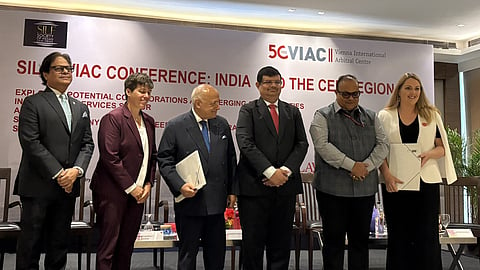
- Latest Legal News
- News
- Dealstreet
- Viewpoint
- Columns
- Interviews
- Law School
- Legal Jobs
- हिंदी
- ಕನ್ನಡ

Justice Tejas Karia of the Delhi High Court on Saturday underlined that India’s laws must evolve along with technological changes in order to remain credible and effective.
He said,
"For business to flourish, there must be predictability in law. Technology is no longer an accessory to the legal system. AI and others are rapidly redefining systems. Together, we can develop a shared vision on principles of progress. The challenges before us is to ensure that legal framework evolves with technology."
Justice Karia was delivering the keynote address at the inaugural session of an event organised to mark the signing of a cooperation pact between the Society of Indian Law Firms (SILF) and the Vienna International Arbitral Centre (VIAC).
“If legal systems wait until disputes arise, they will always remain reactive. By pulling experiences, India and the CE region can experiment with new models,” he said, urging comparative dialogue as a way to design forward-looking frameworks that integrate technology from the outset.
He also reminded the audience that accessibility is as important as doctrinal rigour.
“True strength of any legal system lies in sophistication and accessibility."
On the role of lawyers, Justice Karia made a pointed appeal:
“The profession today cannot be confined to client advocacy alone.”
He urged members of the Bar to step into larger responsibilities, from shaping institutional growth to contributing to systemic reform and mentoring younger professionals.
In his special address, Additional Secretary of the Ministry of Law and Justice Dr. Manoj Kumar described the signing as a milestone in India’s legal journey. He added,
“Law is an engine for development. Today in India, the way work has been done, we see law as a clear highway. India has articulated its vision of Viksit Bharat. Every reform, investment ultimately depends on scaffolding of law.”
Highlighting the transformation through virtual courts, e-courts, and online dispute resolution, Kumar said,
“As we stand today; the need for collaboration is the need of the hour. India can evolve as global hub for arbitration and mediation. Use of AI will add to the process of making cross border transactions easier therefore making legal services and access to justice a reality.”
Kumar concluded by stressing trust and readiness:
“When law is clear, trust grows. India is ready for next chapter of global legal services.”
The event’s highlight was the signing of the Agreement of Cooperation between SILF and VIAC. The pact aims to strengthen collaboration between Indian and Central European legal institutions through training, knowledge exchange and professional development.
The inaugural session was moderated by Dr. Shashwat Bajpai, Founder of DRSB Law Chambers.
Other speakers included:
Dr. Lalit Bhasin, President, Society of Indian Law Firms
Kerstin Peckl, Deputy Commercial Counsellor, Advantage Austria
Niamh Leinwather, Secretary General, VIAC
The inaugural session concluded with a vote of thanks delivered by Arush Khanna, Partner at Numen Law Offices.
The conference then hosted a panel on Contract Enforcement: A quintessential component of a flourishing economic partnership and the role of institutional arbitration.
The panel was moderated by Alipak Banerjee and featured:
Nusrat Hassan, Managing Partner, Dentons Link Legal and Chairman, CIArb – India Branch
Shujath Bin Ali, Chief Legal Officer, Fourth Partner Energy
Vani Mehta, Regional General Counsel, South Asia, GE Aerospace
Niamh Leinwather, Secretary General, VIAC